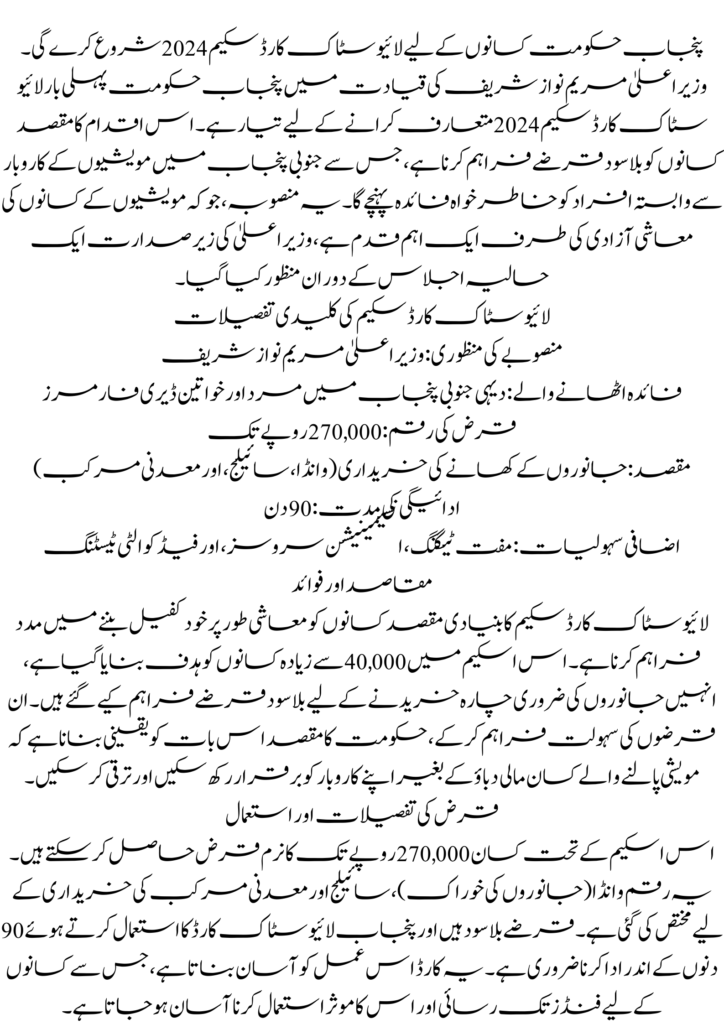The Punjab government, led by Chief Minister Maryam Nawaz Sharif, is set to introduce the first-ever Livestock Card Scheme 2024. This initiative aims to provide interest-free loans to farmers, significantly benefiting those involved in the livestock business in South Punjab. This project, which marks a pivotal step towards economic independence for livestock farmers, was approved during a recent meeting chaired by the Chief Minister.
Key Details of the Livestock Card Scheme
Project Approval: Chief Minister Maryam Nawaz Sharif
Beneficiaries: Male and female dairy farmers in rural South Punjab
Loan Amount: Up to Rs 270,000
Purpose: Purchase of animal food (wanda, silage, and mineral mixture)
Repayment Period: 90 days
Additional Facilities: Free tagging, insemination services, and feed quality testing
Objectives and Benefits
The primary objective of the Livestock Card Scheme is to support farmers in becoming economically self-sufficient. The scheme targets over 40,000 farmers, providing them with interest-free loans to purchase essential animal feed. By facilitating these loans, the government aims to ensure that livestock farmers can sustain and grow their businesses without financial strain.
Loan Details and Usage
Under this scheme, farmers can receive a soft loan of up to Rs 270,000. This amount is designated for the purchase of wanda (animal feed), silage, and mineral mixture. The loans are interest-free and must be repaid within 90 days using the Punjab Livestock Card. This card simplifies the process, making it easier for farmers to access and utilize the funds efficiently.

Simplified Loan Acquisition Process
Chief Minister Maryam Nawaz has directed that the stages for acquiring these loans be simplified to ensure that farmers can benefit without unnecessary delays. The streamlined process is designed to be user-friendly, making it accessible to a larger number of farmers in need of financial assistance for their livestock operations.
Punjab Government to Launch Livestock Card Scheme
In addition to financial support, the Livestock Card Scheme includes several livestock care facilities. These include the Animal Identity Traceability System, which provides free tagging of animals. This system helps in maintaining records and ensuring the health and well-being of the livestock. Additionally, farmers will have access to free insemination services and facilities for testing the quality of wanda and silage. These services aim to improve the overall quality and productivity of livestock farming in the region.
Economic Independence for Farmers
Chief Minister Maryam Nawaz emphasized the government’s commitment to putting livestock farmers on the path to economic independence. By providing these interest-free loans and additional support services, the government aims to create a sustainable and thriving livestock industry in Punjab. This initiative is expected to uplift the rural economy and improve the livelihoods of thousands of farmers.
also read SBP directs banks to adopt digital supply chain finance solutionsSchema
Conclusion
The Punjab Livestock Card Scheme 2024 is a groundbreaking initiative aimed at empowering livestock farmers in South Punjab. With interest-free loans of up to Rs 270,000 and a range of additional support services, the scheme is set to provide substantial economic benefits to over 40,000 farmers. This project reflects the Punjab government’s dedication to improving the agricultural sector and fostering economic growth in rural areas.
Quick Details
| Aspect | Details |
| Project Approval | Chief Minister Maryam Nawaz Sharif |
| Beneficiaries | Male and female dairy farmers in South Punjab |
| Loan Amount | Up to Rs 270,000 |
| Purpose | Purchase of wanda, silage, and mineral mixture |
| Repayment Period | 90 days |
| Additional Facilities | Free tagging, insemination services, and feed quality testing |
| Objective | Economic independence for livestock farmers |
This initiative not only provides financial support but also ensures that farmers have access to essential services that enhance the productivity and sustainability of their livestock operations.
